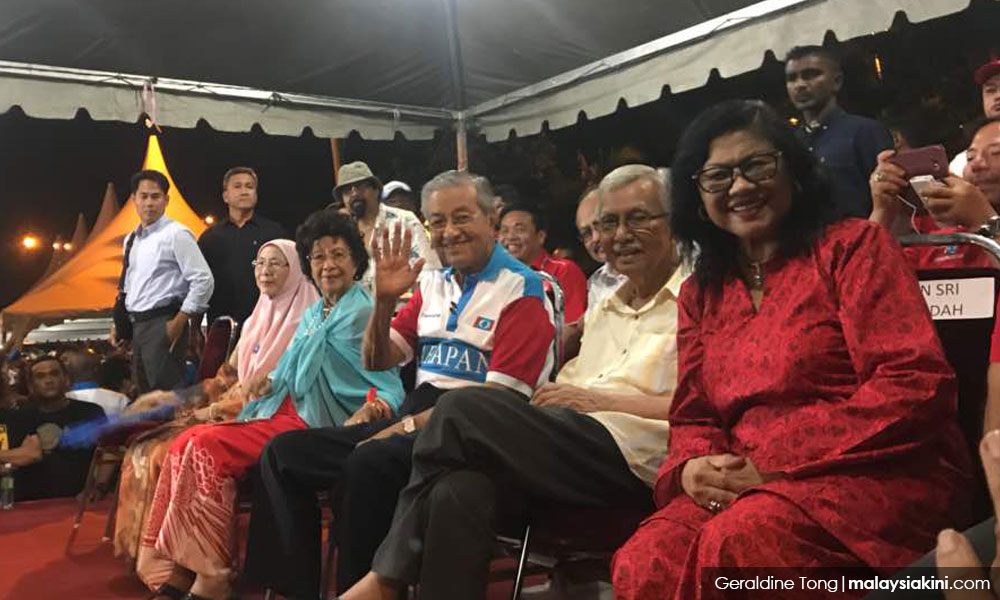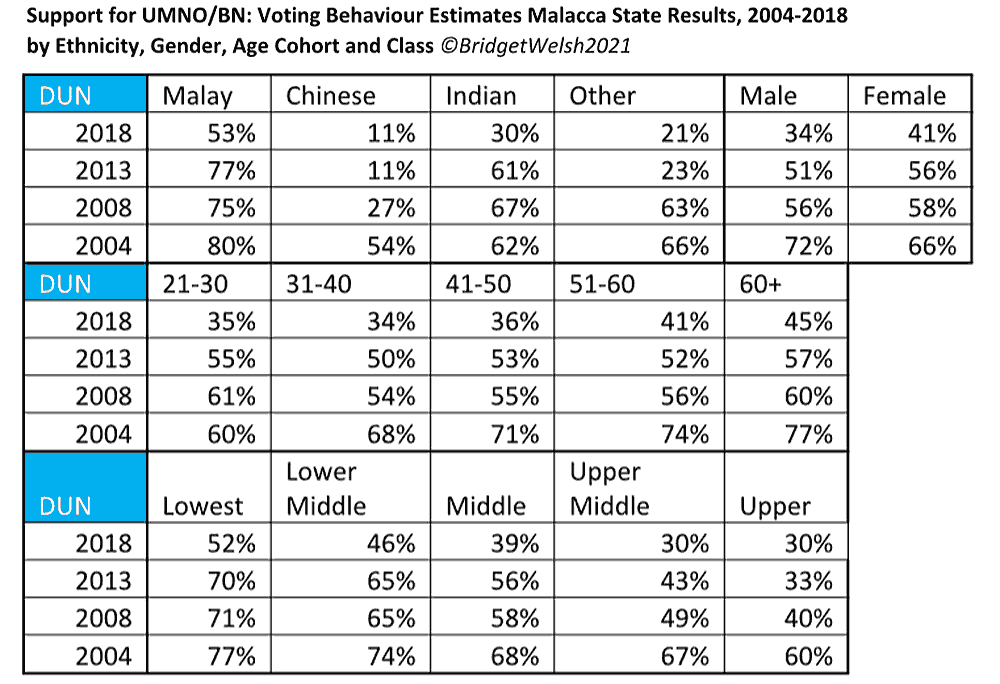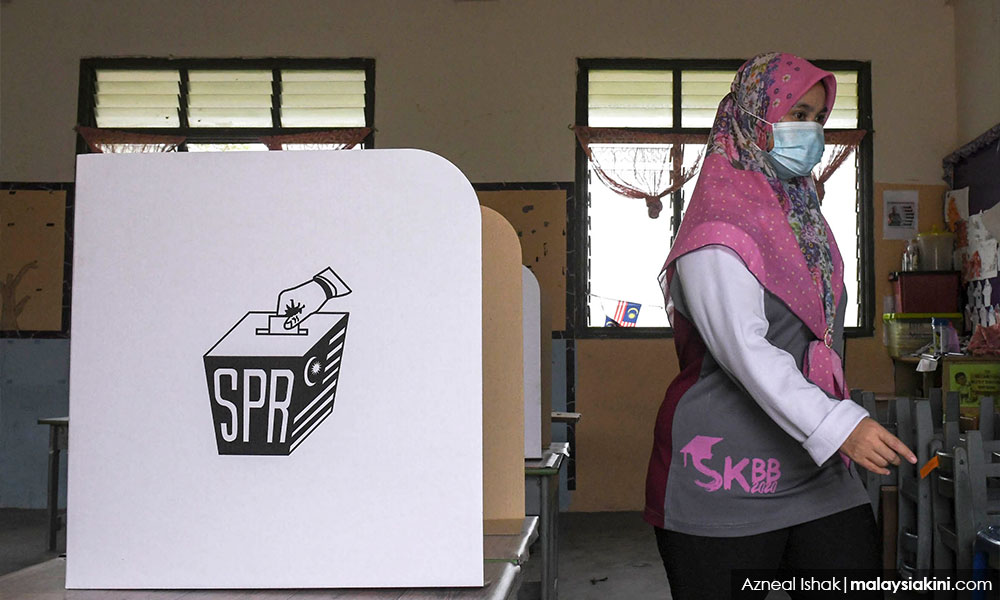The election campaign has started in the 2021 Malacca polls, with 112 candidates running to win 28 seats. In line with last year’s Sabah election, the contests are more competitive – a reflection of the increasing competitiveness of Malaysian politics in general and persistent fragmentation in political parties.
In the first of a series of pieces focusing on the Malacca polls, attention here will be on the past – a review of voting patterns in Malacca and what they tell us about the state’s politics.
Malacca has often been analytically overlooked, in part due to the consistency of the overall outcome favouring Umno/BN and in part due to the localised nature of its politics.
As a relatively small state of less than half a million voters, people know each other, the candidates and the gossips about the candidates. Out of the national limelight, there have not been the same pressures to increase the calibre of representation and strengthen governance.
Beyond the financial bonanza the 2021 campaign will bring (contributing to a depressed local economy), one hopeful effect of the state election will be to draw attention to the unique challenges Malacca faces in development, both economic and political. The voting behaviour analysis shows that voters need more holistic development.
GE14 momentum
The 14th general election (GE14) in 2018 brought the then (and now) opposition Pakatan Harapan into government at the state level. For many, this result was a surprise but it was clear on the ground even then that the historic gem of the 'Umno belt' was changing.
The electrifying May 2018 political rally in Bukit Katil more than halfway into the GE14 campaign put Malacca on the national map - former premier Dr Mahathir Mohamad and two of his former ‘establishment’ ministers Daim Zainuddin and Rafidah Aziz succeeded in reinforcing a national narrative about the future economic stability of a Harapan government and reached traditionally conservative voters who were reluctant to change long-standing political loyalties.

The excitement of the Malacca campaign reverberated locally across the state, enhanced by emotional personal candidate appeals. The end effect was a change in government, a tight competitive contest in which Harapan won a majority by two seats.
Explanations of GE14’s outcome in Malacca centre on four main points:
- The 'Mahathir factor' (pulling older and more conservative voters to the opposition;
- Internal factionalism within Umno/BN (eg tensions between the tainted Najib Abdul Razak administration and state Umno warlord Ali Rustam, Idris Haron and other Umno members' resentment of the parachuting of Najib’s former political secretary Wong Nai Chee as an Alor Gajah candidate);
- The PAS spoiler effect which meant minimally three-cornered races in Malay majority seats that overall disadvantaged Umno. This multi-cornered factor shaped the outcome in half of the state’s seats.
- Finally, a dynamic emotional campaign that developed momentum favouring Harapan as Malacca became swept up in a national electoral tsunami.
Each of these mattered, but to varying degrees in different seats. Collectively, they help explain how Malacca tipped into new political governance and Umno/BN fell.
A slow burn
Yet the voting behaviour findings across different socio-economic demographic groups offer different insights into what happened, and, arguably what could happen again. This analysis uses the Malacca state results of 2004 through 2018 and is a statistical estimate of voting patterns.
Foremost, it is important to understand that the decline in support for Umno/BN has been ongoing for well over a decade. In particular, MCA’s support never recovered after 2008 following an estimated 27 percent drop from 2004, with support from Chinese Malacca voters illustrative of the early collapse of BN as a multi-ethnic vehicle (as shown in the table below).
In a multi-ethnic state such as Malacca – whose composition mirrors Peninsular Malaysia as a whole – the need for a viable multi-ethnic coalition is essential to secure government. No party/coalition can get into government without support across communities.

For Umno, however, the problems also began earlier than GE14. The erosion of Malay support began in 2008 as well. The decline nevertheless was most devastating in GE14 with an estimated 24 percent drop for Umno/BN among Malacca Malay voters. As impactful was the even larger drop of support among Indian Malacca voters of an estimated 31 percent, who comprised a pivotal 6 percent of the then electorate.
To understand the ethnic shifts, it is necessary to look at class voting patterns. Class dynamics measured by estimated income, as I have argued elsewhere, most recently in my co-edited book on the Sabah 2020 election, were (and are) critical in understanding voting nationally.
In GE14, less economically secure voters, B50 (middle class and below) left Umno/BN in droves. Umno/BN has historically depended on poorer Malaysians for support and the hardships of the Najib administration – the impact of poor implementation of the goods and services tax (GST), the general rising cost of living, increasing inequality, inadequate social safety nets and contracting social mobility – resulted in shifts in support.
Umno/BN’s socio-economic B40 base seriously eroded, with over 15 percent estimated decline in Umno/BN support in the lowest socioeconomic brackets. This was compounded by the decay of party institutions, as Umno/BN elites focused more on themselves rather than on the grassroots.
It remains unclear (and unlikely) given the economic realities of Covid-19 and the credit Perikatan Nasional (PN) will take for Covid social safety net measures that Umno/BN will have support levels returned to earlier levels.
It is highly ironic that the person effectively leading the Umno/BN Malacca campaign is former premier Najib, the man associated with the harsh economic realities that precipitated the B50 GE14 Umno/BN political evacuation.
Lower-income voters in the B50 and below will remain decisive in shaping the 2021 Malacca polls.
Shifting political base
A significant cohort among the B50 is young voters with lower salaries, Covid school disruptions and the highest youth unemployment. The youth mattered in GE14 – and will matter on Nov 20.
Umno/BN captured just over an estimated third of voters under 40 in the last general election. A coalition cannot win the government without the young. It is no wonder there has been a push for excluding the estimated 151,000 (mostly young additional disenfranchised new voters, as the fear of the young runs deep.
Youth support has moved to Harapan and PAS, winning an estimated 52 percent and 14 percent respectively of voters under 30 in GE14.

Umno/BN relied on women for support – in their campaigning and at the polls. Women voted for Umno/BN in higher numbers, with an estimated 41 percent compared to an estimated 34 percent of men, but there was a drop in support among women as well at an estimated 15 percent.
Umno/BN has slated the most female candidates – four (three from Umno and one from MCA) in the Malacca polls but only a small share of seats contested, eg 15 percent seats for Umno. While women in Malacca may be less inclined to change electoral loyalties compared to men, there continues to be a willingness to take women for granted across political parties.
Previous voting patterns offer a more complex picture of dynamics on the ground. Shifts occurred across different socio-economic demographics, with economic conditions and outreach to different communities important.
The findings lead to three important observations for the 2021 Malacca campaign:
- Socio-economic conditions matter, especially for the most economically vulnerable;
- Narrow ethnic lens of voters/voting are inadequate to understand the complexities and variation on the ground, and finally
- With the erosion of support over time and across different groups, an easy Umno/BN return to power is not a given.
A tough fight for all contesting is on. - Mkini
BRIDGET WELSH is a senior research associate at the Hu Fu Centre for East Asia Democratic Studies and a senior associate fellow of The Habibie Centre. She currently is an honorary research associate of the University of Nottingham, Malaysia's Asia Research Institute (Unari) based in Kuala Lumpur. She tweets at @dririshsea.
The views expressed here are those of the author/contributor and do not necessarily represent the views of MMKtT.




No comments:
Post a Comment
Note: Only a member of this blog may post a comment.